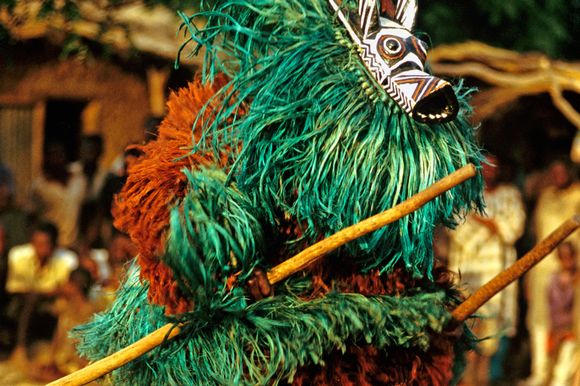| | International 
[ 2011-04-17 ] 

Taxpayers' money is being used to give dancing lessons in Burkina Faso Euro billions wasted on African failures
Britain is pouring more than £1.4 billion a year
into a European Union aid programme that funds
“white elephant” projects and gives billions
to corrupt governments without checking how the
money is spent.
A Sunday Times investigation has revealed that the
European commission has used some of its £10
billion annual development budget to fund a huge
medical store that has been left largely empty, an
immigration and job centre that has arranged six
jobs in three years and a Belgian group that
teaches Africans how to dance.
A damning report by the European Court of
Auditors, which monitors EU spending, has accused
commission officials in Brussels of failing to
manage the risks of waste, mismanagement and
corruption.
The British government, which donates 18% of its
ringfenced £7.7 billion aid budget through the
EU, said this weekend that the commission’s
programme lacked accountability and did not focus
enough on poverty.
Turkey, for example, is the biggest recipient of
EU aid — about £500m a year — even though it
is a developed middle-income country with a
vibrant economy.
Andrew Mitchell, the international development
secretary, said: “The EU’s aid needs to be far
more transparent, results-focused and targeted at
the poorest people and we are now working with
Brussels to help achieve this.”
Projects uncovered by The Sunday Times include the
Central Medical Stores, a flagship foreign aid
project in Freetown, Sierra Leone, which was built
a year ago to house pharmacists and distribution
teams in charge of vital drugs.
Most of the offices are empty or are used to store
damp paperwork. The poorly constructed foundations
are sinking into the mud. Hundreds of hospital
beds donated by the United Nations and intended
for the stores have been left outside to rot in
the humidity.
To add to the ignominy, the caretakers have had to
daub graffiti in the local patois on the perimeter
wall, asking people not to use it as a urinal.
“Nor Piss Yah,” it says.
This complex was created with part of a £238m
tranche of aid being paid to Sierra Leone over
five years by the commission. Officials claimed
this weekend that part of the complex was
operational and providing “great support to the
people” although it was “not in great
shape”.
Sierra Leone, impoverished by a civil war in the
1990s when 50,000 people died, is also the site of
an EU-funded Peace Park wildlife project that
straddles its border with Liberia. The park cost
£2.7m.
Other EU-funded projects in Africa include an
institution in Bamako, the capital of Mali, that
is supposed to help locals find legal jobs in
Europe and to warn them against trying to enter
illegally. But until recently the Centre for
Migration Information and Management, which has so
far cost £8.8m, had found work for only six
people in three years and provided
“counselling” for a few others.
Cecilia Malmstrom, the European commissioner for
migration, admitted the project had “not turned
out the way we hoped it would”.
Other officials conceded that the centre had
failed in its other purpose of informing Malians
about the dangers of illegal migration. “People
say: we know, but we’ll still take the risk,”
said an official at the EU’s delegation in Mali.
MEPs specialising in development denounced the
project, saying it had provided no relevant
support to the local population.
EU taxpayers’ money is even paying for Belgians
to teach Africans how to dance in neighbouring
Burkina Faso, where more than half the population
lives on 70p a day. The “I dance therefore I
am” project is run by Africalia, a Belgian
cultural organisation, which said: “If its music
moves, Africa will also move.”
“EU aid has always been bedevilled by corruption
and waste but lessons have not been learnt after
all these years,” said Chris HeatonHarris, a
Tory MP and former MEP. “They continue to
support questionable projects and corrupt regimes
at a time when national governments are
reconsidering their policies and tightening their
belts.” The European commission’s method of
giving much of its aid through so-called “budget
support” is particularly controversial. It means
transferring billions of pounds to governments in
developing countries, some of which are corrupt
and authoritarian, without earmarking the money
for specific purposes.
While this method is regarded as useful in
well-run countries because it gives governments
the means to help themselves, experts challenge
budget support for regimes that have been accused
of spending millions on private jets and lavish
palaces for their leaders.
About £10 billion has been set aside by the
commission for governments of developing countries
to spend almost as they please in the years
2008-13.
The Court of Auditors says the commission
sometimes randomly allocates funds without
properly assessing a country’s needs and cannot
control the spending or even measure the impact of
the aid.
Officials do not set out what they expect to
achieve, do not tackle extensive corruption and do
not justify supporting some areas rather than
others, the court says. In Paraguay, it says, they
failed to take into account rampant corruption and
waste. The commission eventually stopped direct
handouts to Nicaragua.
In theory, the commission gives budget support
only to countries with a clear national policy and
sound financial management. In practice, the
watchdogs say, corrupt countries need supply only
the appropriate paperwork to receive generous
funding. “Nothing the commission has got comes
even close to a reliable estimate of the impact of
budget support,” said a source close to the
Court of Auditors.
Some of the commission’s generosity is directed
towards governments whose policies provoke dismay
in Europe. Source - The Times(UK)

... go Back | |




